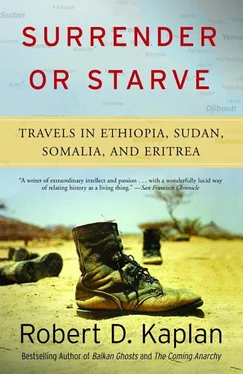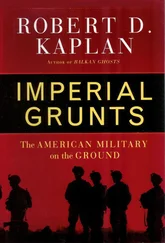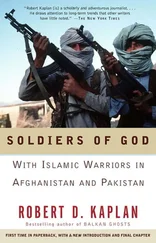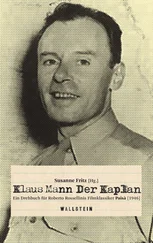Nimeiri’s ouster did not satisfy the strike leaders. A few hours after the coup was announced, a political science professor from the black Christian south, Kunijwok Gwado Ayoker, told me, “We have knocked two teeth out of the monster’s mouth; now we have to knock out the other thirty.” The strikers eventually forced the ruling military council to disband the State Security Force. This made a lot of people feel good, including myself, who along with three British journalists had been detained for several hours and held at gunpoint by Nimeiri’s strong-arm men prior to the coup for the crime of watching an anti-Nimeiri demonstration. At the time, it didn’t occur to me that I actually was lucky. Had I been in any one of several other countries in the region, the circumstances of my detention almost certainly would have been far worse. But nobody, except for a few diplomats, was doing any serious thinking during those first, heady days of democracy.
Nobody realized then that among the first people to take advantage of the freer political climate in Khartoum would be the Libyans. The State Security Force, which had a strong presence at Khartoum airport in addition to having the task of monitoring foreigners inside the country, was the only organized line of defense against Gaddafi’s advance men. After the security force was disbanded, the Libyans poured in by the hundreds and set up “revolutionary committees” that operated slush funds for aspiring Sudanese politicians. In their “surly, unctuous” manner, as a Western ambassador described it, the Libyans had a good streetwise understanding of local politics; they knew that behind the breezy statements about democracy and nonalignment lay many a broke politician and political party sorely in need of ready cash for an election to be held within twelve months. One man whom the Libyans were rumored to have quickly placed in their pocket was the new defense minister, Brigadier Osman Abdullah Mohammed, who spent more than a week in Tripoli after the coup and returned home with a “protocol” providing for Libyan help with “logistics, transport, equipment, training programs” and “aspects of navy and air defense.” Brigadier Mohammed told Sudanese journalists that Libya also would be helping to arrange peace talks between the Khartoum government and the rebel SPLA.
Following the coup, everyone assumed that the SPLA would call a truce because the overthrow of Nimeiri was what its leader, John Garang, had been demanding. But Garang, a U.S.-educated Dinka tribesman, obviously was not going to be satisfied with one group of northern Arabs replacing another in the presidential palace in Khartoum. Garang, whose African southerners for years had been supported by Gaddafi against the pro-U.S. Nimeiri, called the new regime “the hyena with new clothes” and went on fighting. The civil war, rather than dying down, dramatically intensified. The military council responded by marching a four-thousand-troop unit of the Sudanese regular army northward from Juba, the capital of Equatoria Province, in order to capture the SPLA stronghold of Bor. The operation was a “total, utter failure,” according to one Western diplomat. Garang, whose total forces numbered less than twenty thousand, attacked the government column, and those soldiers who weren’t killed refused to march any further. Sudan Airways stopped flying for a time to Juba, and the only way in and out of the city was by chartered plane. Next came an SPLA attack on Renk, barely 250 miles south of Khartoum on the White Nile, the closest the SPLA had ever come to the capital. Garang then appeared capable of cutting off Khartoum’s power supply by blowing up transmission lines connecting the city with the Roseires Dam to the southeast. The government could do nothing; it had virtually no air force and was so short of fuel that it had to requisition diesel fuel from famine relief organizations to run military patrols.
Financed by Gaddafi and headquartered at Itang, just inside the Ethiopian border, the SPLA was a creature of two Soviet allies. It was to them that Sudan’s new leaders were forced to make obeisance—not to the United States, which only was helping to feed starving peasants, a matter farther down on the list of Sudanese government priorities. Neither Libya nor Ethiopia was about to let up the pressure just because Sudan, in the words of some Western commentators, was on the road to becoming a “fledgling democracy.” Quite the contrary: for Gaddafi and Mengistu, a weak new government in Khartoum, which by its own definition was only “transitional,” represented an easy target rather than a credible negotiating partner. It was about this time that the Sudanese defense minister went to Tripoli to sign the “protocol.” Meanwhile, the United States, which was occupied with helicopter drops and other acts of mercy in the far west of the country, was merely a bystander to this whole process.
The Libyans also were active in the west; they took bold, strategic advantage of the famine while U.S. citizens, journalists in particular, were looking the other way. On the Sabbath Friday, August 23, 1985, six days before the Buram helicopter drop, a Libyan relief convoy of forty-three trucks and trailers, escorted by Libyan soldiers, rolled into the Darfur capital of El Fasher with an undisclosed number of weapons hidden beneath sacks of grain and dried milk powder. Around the same time, tribal chiefs from other parts of Darfur and adjacent Kordofan were being invited to Tripoli as guests of Colonel Gaddafi. There was nothing inspired about Gaddafi’s designs on western Sudan, a forward base for his ill-fated adventure in Chad and a place from which to outflank Egypt. It is a tract of desert whose seminomadic Arab and African inhabitants are more likely to know the names of their tribal heads than that of the current ruler in Khartoum. “No umbilical cord links us with the central government,” explained the commissioner of northern Darfur, Abdul Hafiz, who was communicating with Khartoum by radio from El Geneina, a beau geste town about fifteen miles from the Chad border. If not for relief flights operated by international agencies, it would have taken Hafiz nearly a month to travel by land to Khartoum.
Gaddafi couldn’t have picked a more logical target. Darfur was the last unconquered part of Sudan and had resisted all foreign invaders, including the French based in present-day Chad, until May 1916, when an Anglo-Egyptian force of more than two thousand troops backed by airplanes finally defeated the Fur tribespeople of Sultan Ali Dinar. Darfur thus became the west-ernmost province of British-controlled Sudan, rather than the easternmost province of Chad. Afterward, the British gave the local tribal chief complete control of internal affairs. “It was a government within a government,” recalled the present sultan, Abdul Rahman, who occupies a dilapidated villa in El Geneina overlooking a cubist landscape of whitewashed walls and desert. Even today, the people of Darfur harbor little loyalty toward Khartoum. Economically, the flow of people and goods is more in the direction of Libya than of Sudan’s Nile River heartland. The goods on sale under the wattle stalls in El Geneina’s market come by way of Libyan and West African ports, rather than via Port Sudan. Many a woman in El Geneina has a husband working in Libya, where oil wealth makes the salaries much higher. Of course, the United States, because of famine aid, also was making friends in the region. But the U.S. presence was transitory, and in any case, the power in Darfur, as everywhere else in Africa, lay in the bigger towns, such as El Geneina, El Fasher, and Nyala, where nobody was starving except Chadian refugees, about whom none of the locals really cared.
The void in the western desert that the Libyans planned to fill had been deepened by the drought and famine of the past several years, which had forced the migration of Kababish tribes-people out of the area toward the Nile in the east and the savanna lands in the south in search of food and water. Many of these fabled desert warriors, who had a historic tradition of fighting rival Libyan tribes, would not return to their homes. So if Gaddafi decided to invade, he would have found this quadrant of Sudan emptier than ever.
Читать дальше












